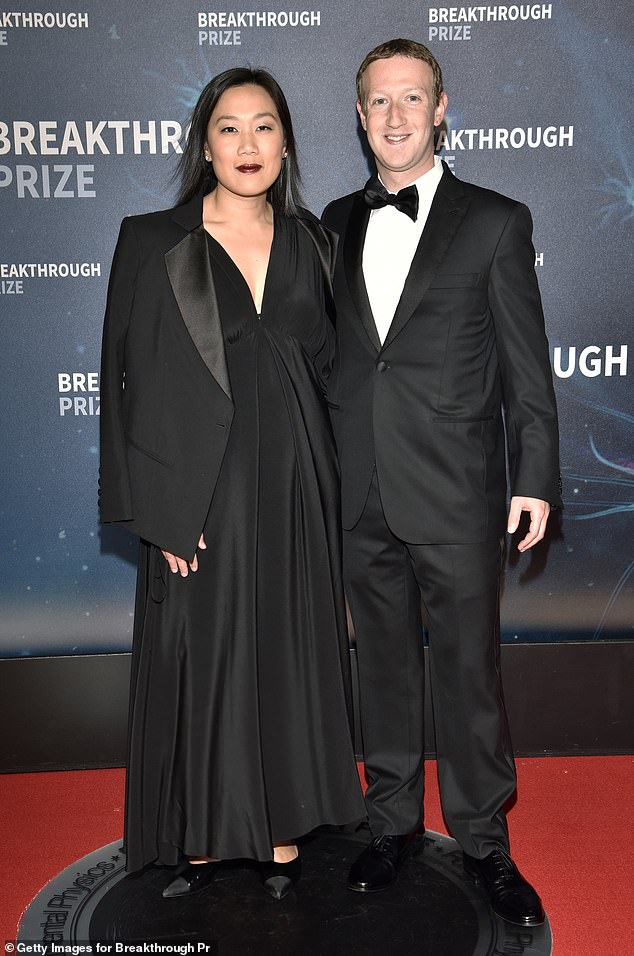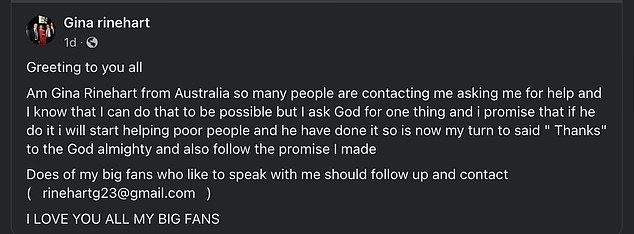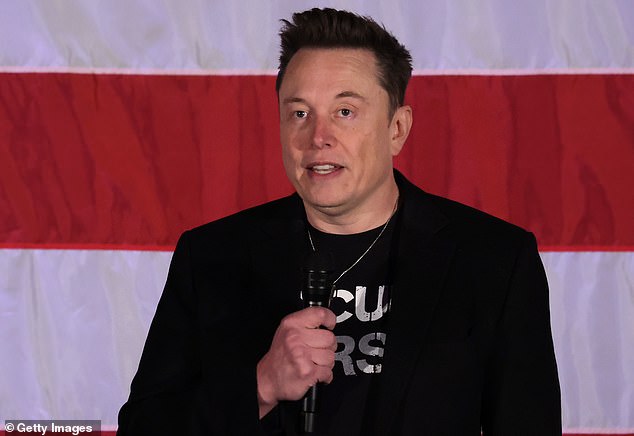Gina Rinehart unleashes on annoying Facebook scourge
EXCLUSIVE
Australia’s richest person has criticized Facebook billionaire Mark Zuckerberg for making money while ordinary Australians were being ripped off of their savings online.
In her latest scathing attack on the company’s lackluster response to social media scams, Gina Rinehart said Facebook’s parent company Meta should reimburse users who fell victim to fraudulent advertising on the platform.
The mining magnate said Elon Musk had proven the online scam scourge could be defeated after effectively ‘rooting out’ unreliable profiles from Twitter, and accused Facebook bosses of failing to take real action.
“I have been calling for action on this issue for years,” Ms Rinehart told Daily Mail Australia.
“Elon Musk’s platform has managed to almost eradicate the scam problem, so why not Facebook?
“They’ve taken too long and done too little to address this.
Gina Rinehart says Mark Zuckerberg’s social media platforms should compensate users who fall victim to the fraudulent scam ads that continue to spread on the sites

Mark Zuckerberg, pictured with his wife Priscilla Chan, and his company Meta are under continued criticism for doing ‘too little’ against social media scammers
“Facebook has made money from advertising revenue and allowed Australians to be ripped off and suffer.
“Apologies aren’t very helpful, but sending money Facebook has received to those they helped cause suffering would be a useful start.”
Ms Ginehart’s comments come after Meta announced this week that it was working on a range of new systems designed to tackle unscrupulous online scammers.
Meta’s vice president of content policy, Monika Bickert, said the measures include the immediate global expansion of a facial recognition trial aimed at identifying and blocking fake celebrity ads.
“Scammers often try to use images of public figures, such as content creators or celebrities, to trick people into seeing ads that lead to scam websites where they are asked to share personal information or send money,” she said.
“This scheme, commonly referred to as ‘celeb bait,’ is against our policies and is bad for people who use our products.
“Of course, celebrities are featured in many legitimate advertisements. But because celeb-bait ads are often designed to look real, it’s not always easy to detect them.

Just one of hundreds of online scam posts impersonating Australia’s richest person

Ms Rinehart says Elon Musk has proven that social media platforms can beat the scourge of celebrity ad scams after the billionaire removed thousands of untrustworthy profiles from Twitter
‘We will attempt to use facial recognition technology to compare faces in the ad with the public figure’s Facebook and Instagram profile pictures.
“If we confirm a match and determine the ad is a scam, we’ll block it.”
She said the technology will not be used for any purpose other than combating online fraud.
“We will immediately remove all facial data generated from ads for this one-time comparison, regardless of whether our system finds a match,” she said.
Meta has come under fire for its failure to stop scammers from posting fake celebrity ads on the social media platform for years, with Ms Rinehart being a particularly prominent and long-standing critic.
The billionaire philanthropist wrote to Zuckerberg last November, urging him to do more to remove the countless thousands of fake ads spreading on his social media sites.

Former A Current Affair presenter Tracy Grimshaw has also spoken out about the fake celebrity adverts
“In Meta, numerous scammers have falsely used the names of prominent Australians such as Harry Triguboff, Dick Smith and myself in an attempt to fraudulently solicit money from vulnerable people,” she wrote.
‘This scam has also deceptively involved the names of high-profile media personalities from Channel 7, Sky, Channel 9 and others, who have wrongly used them in scams in attempts to take money from innocent people.
‘In recent weeks I have had over 750 scams on Facebook, compared to just one on Twitter in the same period.
“More action is needed to prevent scams and deliberately fraudulent content from becoming available and advertised to millions of Australians.
“It is a common trend of real Australians losing their hard-earned money, including a retired Queensland widow who was cheated out of more than $150,000 from her retirement savings and pension in 2022.
‘In another example, an Australian lost $40,000. Innocent Australians are falling victim to job fraud via Facebook.

The identity of Popular Today presenter Karl Stefanovic, pictured with his wife Jasmine, has also been stolen and misused by unscrupulous online scammers
‘Victims often struggle with the heartbreaking prospect of losing their homes and savings, leaving individuals and families in a state of distress and despair.
“In addition to the tangible losses of billions of dollars, the emotional and psychological toll is enormous.
“There was one scam operating (last November) where Tracy Grimshaw, a high-profile media personality in Australia, and I were falsely used in a fake news story encouraging Australians to invest AU$40,000 in a fake revenue-generating software program.
“This scam has been active in some form on Meta platforms since January 24, 2023, despite being reported.”
Grimshaw and other high-profile TV celebrities, including Karl Stefanovic and David Koch, have also been hit with Meta for failing to take appropriate action against fraudsters who illegally misuse their identities in fake advertisements.
However, Meta said its new facial recognition program would solve this, with the program expanding to include the faces of 50,000 global celebrities in the coming weeks.
“Initial testing with a small group of celebrities and public figures shows promising results in increasing the speed and effectiveness with which we can detect and combat these types of scams,” the company said.

Former Sunrise presenter David Koch has called on Meta to take immediate action to stamp out online scammers
The company said the public figures would receive an in-app notification warning them that their faces had been automatically included in the program, although they could opt out at any time.
“We have also seen scammers impersonate public figures by creating fraudulent accounts, with the aim of tricking people into engaging with scam content or sending money,” the company said.
“For example, scammers may claim that a celebrity has endorsed a specific investment offer or ask for sensitive personal information in exchange for a free giveaway.
‘We are currently using detection systems and user reports to help identify potential imitators.
“We are investigating whether we can add another step to find these types of fake accounts faster.”
